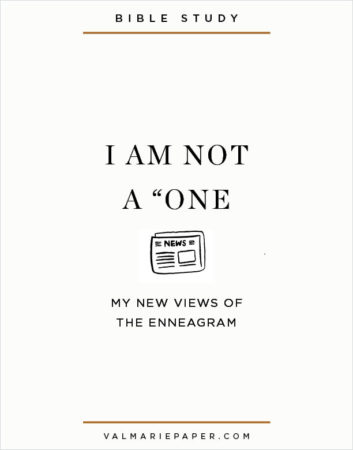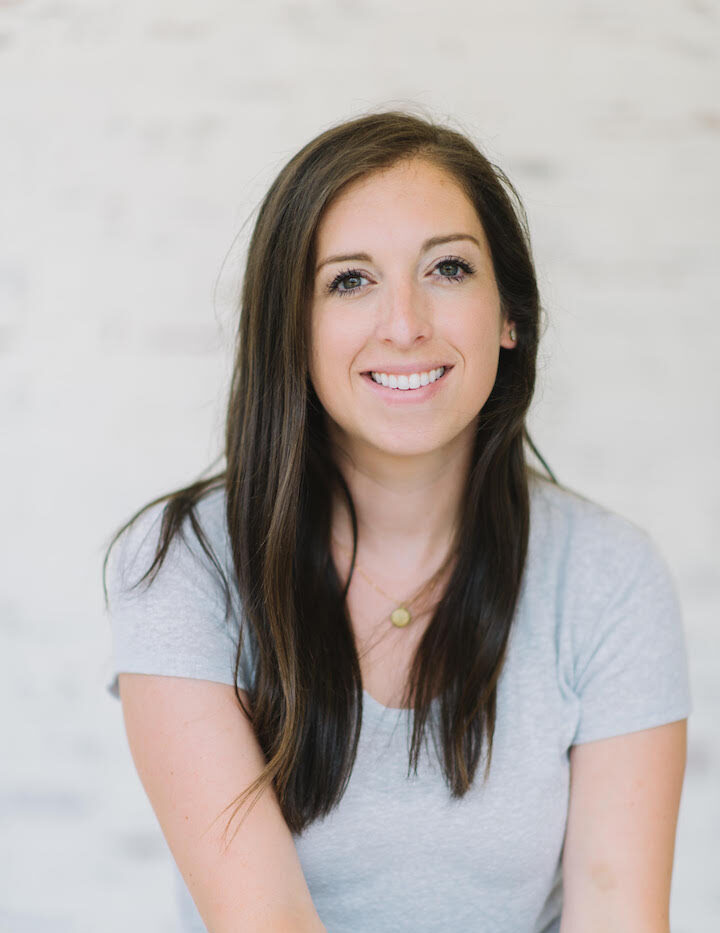This might be one of the toughest posts I’ve written. I know how widespread the Enneagram is. I know it’s widely accepted. I personally really wanted it to be okay.
But I’m not a “one” anymore. If you know about the Enneagram, you likely have an idea of what a “one” means. And no, my number didn’t change. I’ve changed my views on the Enneagram as a whole.
Normally, I spend 99% of my time talking about what I’m for rather than what I’m against. So, today’s post may feel a little out of character, but because I’ve shared previously about the Enneagram in a positive light, I feel it’s important to share when I learn things that affect what I’ve shared.
I’ve actually been quiet about the topic of the Enneagram for a while because I just haven’t been sure of what I think about it. After we shared a post about the Enneagram and Prayer and ideas for how to make a habit of prayer based on your personality, I got asked to publish a book on the topic (which was so flattering!) and even then I just felt uneasy creating such a permanent product on something I wasn’t 100% sure about and said no. If I created a book on prayer, I wanted it to be a classic, something that in 20 years I could be proud of and confident in its content. (Funny enough, I just announced the title and cover of that book last week! 😁 )
Lo and behold, a few years have passed and I have done some more research including this very helpful podcast episode from Alisa Childers that opened my eyes to many things I didn’t know about the Enneagram. I knew it had a questionable start, but only vaguely, and heard enough people equate it to the idea that Christmas was also originally pagan so the Enneagram was okay too.
I want to share some specific red flags. You may be able to rebuttal each one perfectly, but keep reading because I’m totally okay with that!
1. The guy who wrote the types said he wrote it “automatically”. Wiki says “Automatic writing, also called psychography, is a claimed psychic ability allowing a person to produce written words without consciously writing.” Here’s a video about the Enneagram’s origin.
2. The first well-known book on the Enneagram by a Christian was, The Road Back to You. This book made it feel okay. As I started reading about the Enneagram, it did feel like that little fact, that Christians were writing whole books on it, meant it must be fine. Come to find out, both authors of the book consider themselves progressive Christians and follow the teaching of Richard Rohr. I didn’t know a ton about Rohr, but from the little I did know, this was a major red flag. (Just a couple things Rohr believes–all religions share the same truth and are just different paths, and Jesus’ death on the cross wasn’t necessary. This recent tweet from Rohr says a lot too “I say we need to switch our thinking from ‘Jesus came to fulfill us’ to ‘we have come to fulfill Christ.’ We are part of this ever-growing cosmic Christ that is coming to be in this one great big act we’re all part of.”) Many conservative Christians that currently study the Enneagram still quote early Enneagram adopters, like Rohr.
3. The defense in favor of using the Enneagram as Christians feels like it’s really trying to force the idea that it’s okay. As I began to read the arguments FOR the Enneagram by believers, and even pastors, the arguments were pretty weak. One argument was that Paul used false gods in Acts 17 to point people to Christ. That’s valid, but he didn’t use false gods to point people who were already Christians to Christ.
4. How is this test different than Meyers-Briggs? The spiritual undertones mean you likely will not find a book on the Enneagram that’s just a basic facts about personality. It will have a Christian-spin or a spiritual one. Even as we worked on our post years ago, I asked Kara to research, and one of the books I suggested ended up being spiritual but not really Christian at all. It’s too easy to slip into ideas that aren’t biblical when books have a spiritual slant.
 Essentially, anything that made me feel like maybe it was okay was wiped out by these points. On the podcast, Alisa and her guest, a former psychic of 20 years, talked about how prevalent the enneagram is becoming in the church and essentially how we’ve made it seem okay when really, it’s something sneaking into churches much like new-age beliefs have entered in previous generations. I knew exactly what they meant because recently, I had read several books on prayer from the 70-80s and they mentioned the serious threat of Ouija boards in youth groups and other occult beliefs.
Essentially, anything that made me feel like maybe it was okay was wiped out by these points. On the podcast, Alisa and her guest, a former psychic of 20 years, talked about how prevalent the enneagram is becoming in the church and essentially how we’ve made it seem okay when really, it’s something sneaking into churches much like new-age beliefs have entered in previous generations. I knew exactly what they meant because recently, I had read several books on prayer from the 70-80s and they mentioned the serious threat of Ouija boards in youth groups and other occult beliefs.
With all that, I’m letting the Enneagram go.
But what if I’m wrong? What if the Enneagram is really okay?
I’ll live.
I don’t mean that to sound snarky, but the truth is, it might be fine but it’s not necessary to my faith.
1 Corinthians 10:23 says,
“You say, ‘I am allowed to do anything’—but not everything is good for you. You say, ‘I am allowed to do anything’—but not everything is beneficial.”
And I’m already seeing the reality of that. As I untangle myself from the Enneagram, I am able to acknowledge sanctification in a deeper way. When I was a “one”, being a perfectionist, naturally judgmental or hard on myself and others became my identity. This is coming from someone who for the last few years felt very confident I wasn’t using my number as something that boxed me in. I truly didn’t feel limited by it until I stepped back and imagined my life without the label of “Enneagram 1 / Perfectionist”.
I saw my sanctification in the complete way that Scripture talks about. It isn’t limited by who I identify myself as.
If you’ve got a lot of sunk cost (became a coach, did the workshops, brought it to your church) in the Enneagram, it might be really hard to hear this and I totally understand. When we’ve invested a lot in anything, we’re more prone to want to defend it instead of cut our losses. I totally get that because I’ve totally done that.
My hope is that for those unsure, or for those I’ve influenced in any way to check it out, I can share what I’ve learned.
And please, don’t take my word for it! I challenge you to do some research, and more than anything pray that the Lord would give you discernment. I don’t pretend to have all the answers and can share a bit of my own journey as I learn things but I will always challenge you to seek the Lord for wisdom.





Leave a Reply
Comments (0)